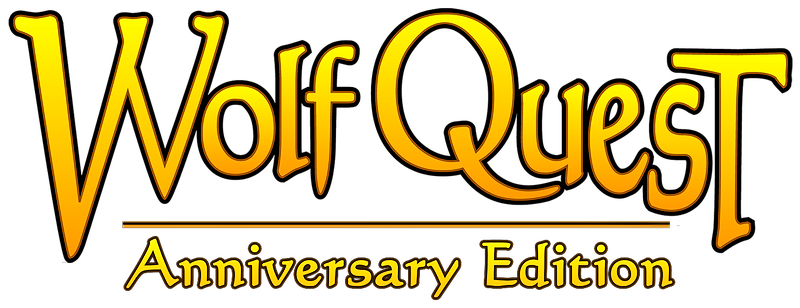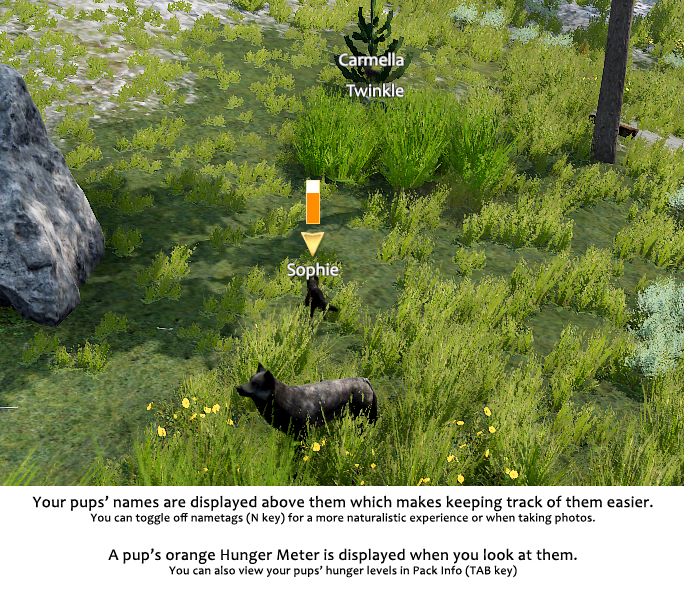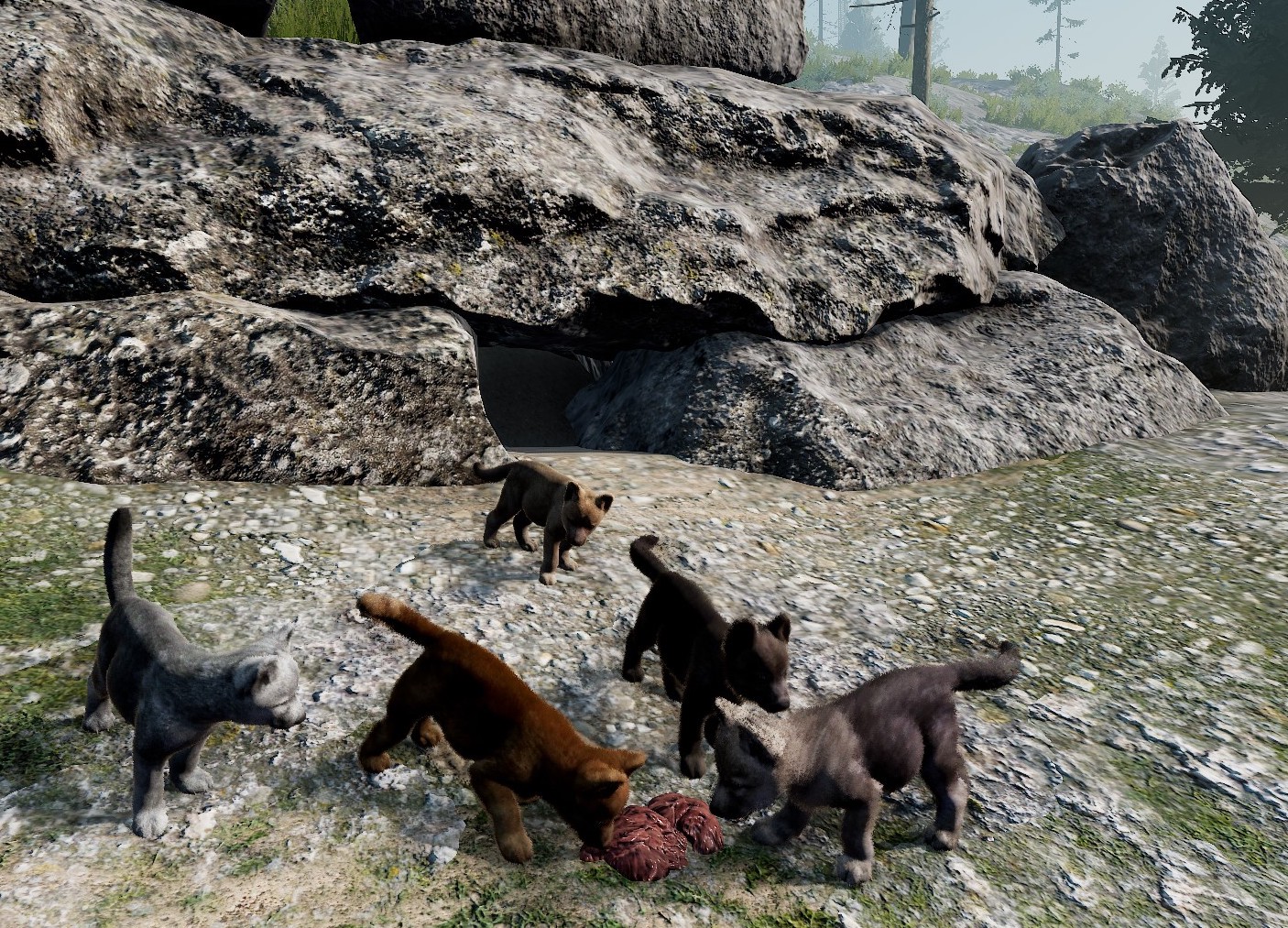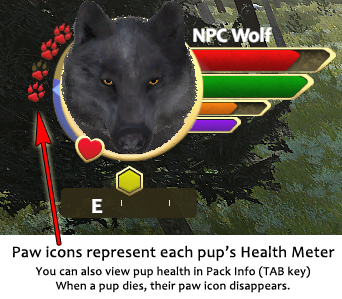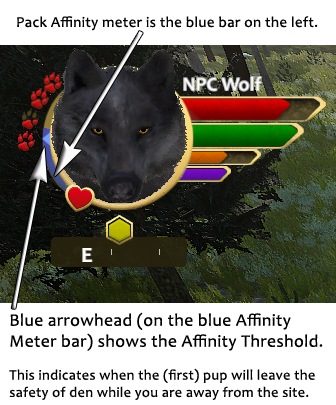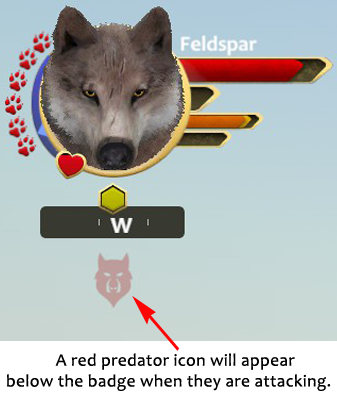Now four weeks old, your pups have grown big and strong enough to spend time outside the den. As they frolic in the fresh air, socialize with them with playful emotes to increase the affinity (closeness) of your family pack. If they're playful, play with them. If they're hungry, feed them. If they stray far from the den, go find them and carry them back.
Pups mostly eat meat, regurgitated by you and your mate or, later, directly from carcasses. You must also protect them from predators who may see a wolf pup as an easy target.
Keep feeding your pups until they weigh 15 pounds. Then it'll be time to journey to the summertime rendezvous site.
Meet Your Pups
In the game, you can have up to seven pups in a litter. As you get to know your pups, you will see how their unique traits and personalities makes parenting all the more fun.
Pups have a variety of coats and attributes. They also have different personalities. All the pups do all the pup behaviors, of course. But personality might influence what you see them doing. Bolder pups will be more adventuresome, perhaps wandering or leaving the den sooner to explore. More cautious pups might hang back or stay closer to the den. Some pups are more social and love to play with others while other pups might prefer to spend more time on their own. Energetic pups spend less time laying around than lazier pups. Of course, the "secret sauce" of this infinite combination of three axis: bold<>cautious, social<>loner, and energetic<>lazy melds with other things like their current stats and their attributes to create pup variety. Most importantly, the way you, the player, interpret and experience your pups is unique.
Pack Stats
You can view your pups in the Pack Info tab opened by pressing the TAB key. This displays each pack mate's name, health and hunger, and the pups weight and wakefulness. Your pack affinity is also displayed.
Pup Names
Your pups will be given a numerical designation and gender (M or F), e.g. 1824M. You can give them a nickname when they are born and at any time in the Pack Info panel.
The N key toggles on/off your pups' on-screen nametags.
Coat Colors
Pups inherit their coat color from their parents. Behind the scenes, the game tracks this gene, called the K Locus, which determines of wolf coats are black or gray (which also encompasses brown and lighter colors). There are three variants for both adult wolves and pups: kk, Kk or KK. This variant determines whether the pups has a gray or black coat, and has some implications for health (in terms of susceptibility to illness). Keep in mind, you might not be able to guess their underlying genetics just by looking at coats since there is a lot of variation and they change as they age.
Watch this video to learn about the WolfQuest genetics system: Genes Behind the Scenes
Attributes
Like adult wolves, pups have attributes (Strength, Stamina, Speed, and Health), which are inherited from the parents using standard genetics methods. These stats are not displayed until they grow up.
Personalities
Pups also get their personalities from their parents. We’ve created a three-axis personality matrix that works behind the scenes and affects how pups act and react throughout the game:
- Cautious <> Bold
- Social <> Loner
- Energetic <> Lazy
The purpose of this system is to add variety and interest to enhance the player experiences roleplaying and storytelling. Just remember, the most important factor in interpreting pup personalities is your own experiences and perceptions. And, if you choose to later play a pup as an adult, you can have them behave however you like.
Keeping Track of Your Pups
Pups will stay within the den site. However, they may wander further than you want them to, especially as they get more adventuresome with time. Pack Affinity affects how well they follow directions (see more below).
Each pup's name is displayed above them. The N key toggles on/off nametags.
Each pup's Hunger Meter is displayed above them (HUD can be toggled off with "i" key or Game Settings. You can also view your pups' Hunger level in the Pack Info tab opened by pressing the TAB key.
PupCam
Enjoy getting a closer look at what each pup is doing with PupCam. Tap Shift-F to switch to PupCam, where you can follow each pup around. Tap Shift-F again to jump to the next pup, and so on, and finally back to your wolf or press spacebar to jump back to your wolf anytime.
Feed Your Pups
The most important part of raising your pups is ensuring that they all receive enough food to stay healthy and keep growing. To complete the Raise Pups quest, all your pups need to reach 15 pounds.
Regurgitate Food
Young pups' little jaws can't eat meat so parents must regurgitate food for the pups to digest more easily. Carrying food in your stomach is an easy way to bring food back to the den. While raising pups, you can fill your stomach up to 125% its normal capacity. While this extra food is intended for pups, it will be digested if you don't return to regurgitate it within several hours. So the best time to feed your pups is immediately after returning from a hunt.
To regurgitate food, approach a pup and press SPACEBAR once. Your wolf will regurgitate some food that the pups are happy to gobble up. You may need to do this several times in order to feed all of your pups. You can only regurgitate as long as your food level is above 75%.
Eat Meat
Once pups are six weeks old, they will be able to eat meat directly, in addition to regurgitated meat. You can carry small prey and meat chunks back to the den site to supplement what you are able to carry in your stomach for pups. Pups can also eat from large carcasses if they are near enough the den for pups to access.
TIP
- In the game, all food is the same nutritionally.
Calf Season Provides Additional Well-Timed Food
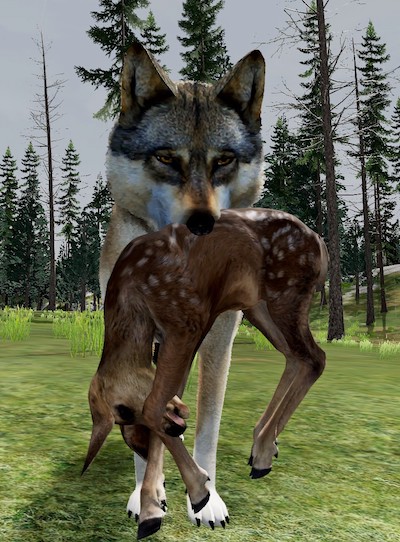
New moose calves are also on the menu starting in early summer. These babies are "followers" rather than "hiders" and are able to keep up with their mothers shortly after birth.
TIP: Game music usually changes when you are near a mother ungulate that has a newborn hidden nearby.
Pup Health
Pups can take damage from predators and suffer illness. Sleeping restores their health (resting does too, but at a slower rate).
Each pup is represented by a red pawprint icon on the left of your wolf badge. You can have up to seven pups. When a pup dies, their pawprint icon disappears.
The pawprint icons are also their Health Meter, with the fill level indicating that pup's health level. You can also view pup health in Pack Info (TAB key).
Illness
Pups can fall ill. They may recover on their own or they may die. Companionship (spending time with them) will improve their odds of recovery but won't guarantee it. You can spend up to two game-hours (five realtime minutes) in this Companionship mode each game-day, before a cooldown is triggered.
Their pawprint icon will glow when you are spending time with them.
Some pups are more susceptible to illness.
- All pups with two gray-coated parents, and roughly half the pups with one gray and one black parent, will have gray coats and average resistance from diseases. (In terms of the K locus, they are kk -- watch videos linked below for explanation of the K locus.)
- Most black-coated pups with two black-coated parents will have higher disease resistance (they are Kk). Occasionally a black-coated pup in such a litter will be very vulnerable to disease (KK) and likely to die at some point. However, these litters are likely to be smaller than those with gray-gray or gray-black parents, as some of their KK pups will have died before birth.
Watch these videos to learn about how coat color and the WolfQuest genetics system:
TIPS
- Spending time (called "companionship") with a sick pup will improve the odds of recovery but won't guarantee it. You can do companship for two game-hours each game-day before triggering a cooldown period.
- Spending time in the den does not affect recovery from illness.
- Sick pups may lose their appetite when sick but feeding them does not affect recovery from illness (nor does food make them sick).
- Fleas don't cause illness in the game. (In real life, fleas can be disease vectors but we did not include that in the gameplay). Flea load does not affect recovery.
Pack Affinity
Wolves live in socially complex groups and spend time maintaining family relationships. You gain Pack Affinity by interacting with your pups and spending time with them at the den. Use positive Emotes such as Play Bow, Howl, or Roll to interact with your pack. Each time a pack member responds to you, you will gain a small amount of Pack Affinity.
The Pack Affinity meter is shown as a blue bar on the left edge of your wolf badge. The little blue arrowhead on the blue bar shows the affinity threshold for when the (first) pup will leave the safety of the den while you are away from the site.
You can also view the Pack Affinity percentage in Your Pack Stats on the Pack Info tab, opened by pressing the TAB key.
Affinity Tips:
- Your mate and pups may lose interest or get tuckered out after too much socializing. If they do, wait a short time before more socializing.
- If you use hostile Emotes such as Snarl, your pack affinity will drop.
- Pack affinity fades with time and drops much faster when you and your mate are away from the den.
Your Mate
Behavior
Your mate will assist with hunting, socializing, feeding, and protecting your pups. If a pup gets lost, they may even try to find it and bring it back to the den. Mates will occasionally go on solo hunting trips if they or the pups are hungry. Your mate will do these things without being commanded to, but if you wish you can use certain emotes to instruct them.
Command Your Mate
You can command your mate to help with certain tasks in Slough Creek. You can invite them to join you on a hunting or territory-maintenance excursion by going to them and Whining. This will tell the mate to follow you on your sojourn.
You can also use your secondary howl to ask your mate to join you, wherever you are on the map.
If you out are on a hunting trip with your mate, you can also tell them to return to the den by Woofing at them.
Mate Personality
You will recall from the Find a Mate quest that mates have unique personalities resulting from a behind the scenes, three-axis personality matrix:
Cautious <> Bold
Social <> Loner
Energetic <> Lazy
This will influence how they meet their parenting responsibilities.
Pup Perils
Predators
Some predators (stranger wolves, cougars, coyotes, eagles, and grizzlies) will periodically attempt to kill your pups. Grizzlies, cougars, and eagles see your pups as food and will attempt to carry them away to eat, giving you a chance to save them (except for eagles, since you can't fly). Stranger wolves and coyotes consider pups as future competition that are best eliminated while helpless, and so will kill them immediately. Maintaining a large and strong territory (ideally with two hexes between your den and stranger wolf territory) will help deter stranger wolf attacks, but you will still need to be vigilant.
To protect your pups, be watchful! Some predators will attack immediately. Others may spend time observing your den site until they decide that the time is right to ambush a pup. When you spot a predator, intimidate or fight them until it flees or is defeated. Be sensible, a dead parent can't raise pups!
When a predator is attacking, a red predator icon will appear under your compass. It indicates what type of predator so you can react accordingly.
Predator Defense Tactics
Be alert! Know where your pups are and watch for danger. Retrieve straying pups. You can drive predators away by growling, snarling, or biting. Obviously, there are risks to fighting so be careful.
If a grizzly or cougar manages to get one of your pups, all is not lost! You can chase it down and try to get it to release your pup by biting the marauder. If you are successful, the predator will drop the pup, and either flee or come back and try again. However, the pup's health drops quickly if grabbed, so you have only a few moments to rescue them.
Eagles attack from the air, so switch to Headcam mode (T key) and track their movement. Try to stay close so you can interrupt their diving attack and thwart their effort to grab a pup. Intercept eagles to interrupt their attack (you can't catch or kill eagles).
Stranger wolves and coyotes kill your pups to reduce competition, not for food, so there's no chance to rescue a pup from their jaws. Your only defense is driving them away or defeating them before they nab a pup.
Safety at the Den Site
Pups are safe when inside the den. Unlike in real life, predators will not enter the den or dig out pups.
Pups will go into the den when you Woof (using Emotes panel).
Be aware that if you Woof when a predator is lurking, it will attack immediately, hoping to grab a pup before it disappears into the safety of the den.
Pups will stay in the den for awhile but they may come out on their own as time passes, depending on their personalities and the level of your pack affinity (see below). The boldest of your pups may exit the den sooner and get into trouble before your return. So be sure keep your pack affinity high, socializing frequently with your pups while you are at the den, and spend as much of your time there as possible.
Wandering pups are easier targets, so don't let them stray too far. You may have to carry adventuresome pups back closer to the den. To pick up a pup, Press and hold the SPACEBAR. Tap to put them down.
You can Woof at your mate if you want them to stay at the den site with the pups. If you are on a hunting trip with your mate, a Woof will send them back to the den.
If you tell your mate to go to or remain at the den the pups may leave the den (even if you told them to go into the den), since the mate is there to guard against den raids. So you may return to the den to find your family out and about if your mate is at the den.
Willingness to spend time in the den is also affected by the den's flea load (see below).
TIPS
- Spending time in the den will increase flea load (see below).
- Spending time in the den will not affect pup health, illness, or recovery from illness.
Fleas
As you and your pups spend time in your chosen den, fleas will arrive and gradually proliferate. Fleas are tiny insects that bite and suck blood from their host making wolves itch and scratch. At first, they have minimal effect, but as the flea population rises, your pups will become increasingly reluctant to stay back in den while you are away on a hunting or territory excursion.
In addition, you and your pack will suffer from occasional bouts of itchiness. Afflicted wolves will stop and scratch for several seconds, and will be unable to anything else for a short period of time. These bouts occur more often as the fleas worsen.
The more time that your pups spend in the den, the faster the flea situation will worsen. If the flea load reaches 100%, you must move to a new den. But you can always move sooner if the scratching is too annoying.
You can view your den's flea load in the Pack Info tab opened by pressing the TAB key.
TIPS
- Fleas don't cause illness in the game. (In real life, fleas can be disease vectors but we did not include that in the gameplay).
- Fleas don't affect health in the game.
Moving to a New Den
You can move to a new den site whenever you like. Keep in mind, moving can be dangerous. Reasons to move dens might be a high flea load, proximity to stranger wolf territory, or a natural event.
To move to a new den, go to your Pack Info menu and press the "Move to New Den" button. You must be at your den for this option to be available. This will begin the process of moving to a new den.
Check the World Map to see the location of each potential den that you've already discovered. Nearby dens will also appear on the compass. Decide on one, then lead your pups to their new home.
If you need to go hunting while between dens, find a patch of tall grass and Woof to tell your pups to hide themselves in it. There they will be safe while you are away. You can also send them into tall grass if a predator approaches and you need to chase it away. Squeak to call them out again.
Keep in mind that your pups will move more slowly the more tired they are. If your pups are lagging behind, consider giving them some rest. If they are quite tired, they will refuse to follow you.
Once you've arrived at your new den, you can select it in the same manner as during the Find a Den quest. All of your pups will need to be nearby before you can do so. The new den will have a flea load of zero.
Completing the Raise Pups Quest
When almost all of your pups have grown to 15 pounds, it will soon be time to leave the den and travel to your summertime home base, called a rendezvous site. Start planning your trip by opening the World Map, which now shows the locations of possible rendezvous sites in your territory. After all of your pups have reached 15 pounds, return to your den to trigger: MAIN QUEST: Journey to Summer Home.
Multiplayer Pup Raising
You can also raise pups in multiplayer in Story mode. See Multiplayer articles for multiplayer-specific gameplay.
